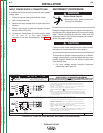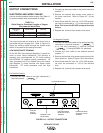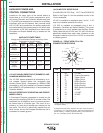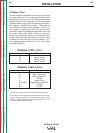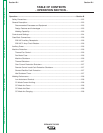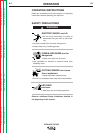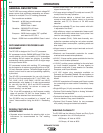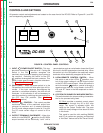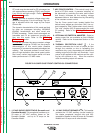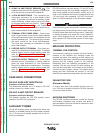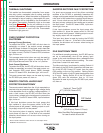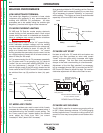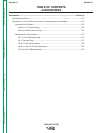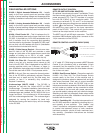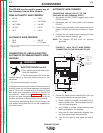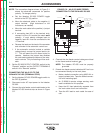
Return to Section TOC Return to Section TOC Return to Section TOC Return to Section TOC
Return to Master TOC Return to Master TOC Return to Master TOC Return to Master TOC
OPERATION
B-5 B-5
IDEALARC DC-655
CC mode may also be used for CC submerged arc
with appropriate arc-sensing CC(VV) wire feeders
if arc force is set high enough. Refer to Welding
Performance section.
CV MIG provides a constant voltage output char-
acteristic through the 13 to 44 volt range. The volt-
age is adjusted within this range by the Output
Control dial.
The dynamic characteristics of this mode are ideal
for open arc processes including, MIG/MAG
(GMAW), Innershield®, and other cored wire
(FCAW) processes. Faster travel submerged arc
processes and CV air carbon-arc gouging may
also use this mode. Refer to the Welding
Performance section.
CV Sub-Arc provides the same constant voltage
output control range as CV MIG, but the dynamic
characteristics of this mode make possible
improved CV (constant wire speed) submerged arc
welding. This improved process is most notice-
able on high deposition slow travel speed welds.
Fast travel, narrow bead subarc welds will have
better performance in CV MIG mode.
7. ARC FORCE CONTROL - This control is only func-
tional in CC Stick mode. It prevents “stubbing” of
the electrode by providing the extra weld current
that linearly increases as the welding voltage
decreases below a level determined by the setting
of the constant current control.
The Arc Force control knob, located behind the
latched cover, adjusts arc force from “Min” (no cur-
rent increase) to “Max” (higher short circuit current).
The “mid” position (#5) is recommended for most
CC welding. Refer to the Welding Performance
Section.
8. OPTIONAL VOLTMETER & AMMETER - Digital or
analog meter kits are available as field installed
options. Refer to the Accessories Section of this
manual.
9. THERMAL PROTECTION LIGHT - If the
machine overheats due to lack of proper air flow
through the machine or due to exceeding the
machine’s duty cycle, thermostats will disable the
welding output and this light will illuminate. Input
power is still applied to the machine and the cool-
ing fan will continue to run. When the machine
cools the welding output will resume.
FIGURE B.2 LOWER CASE FRONT CONTROLS & CONNECTIONS
7
6
5
4
3
1 2
1. 115 VAC DUPLEX RECEPTACLE (Domestic and
Canadian Models) This receptacle provides up to
20 amps of 115 VAC auxiliary power on the
Domestic Models and up to 15 amps on the
Canadian Model.
2. 115 VAC CIRCUIT BREAKER - This breaker
protects the 115 VAC auxiliary circuits located in
the duplex receptacle, terminal strip and MS-
receptacle. Breaker is rated 20 amps on Domestic
Models and 15 amps on all other models.



